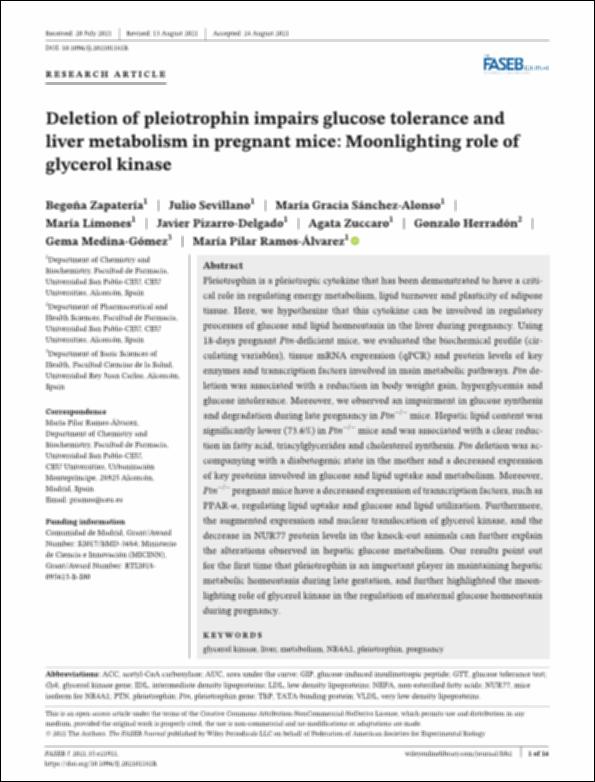Please use this identifier to cite or link to this item:
http://hdl.handle.net/10637/13785Deletion of pleiotrophin impairs glucose tolerance and liver metabolism in pregnant mice: moonlighting role of glycerol kinase.
| Title: | Deletion of pleiotrophin impairs glucose tolerance and liver metabolism in pregnant mice: moonlighting role of glycerol kinase. |
| Authors : | Zapatería Gómez, Begoña Sevillano Fernández, Julio Alonso, María Gracia Limones Cornejo, María Pizarro-Delgado, Javier Zuccaro, Agata Herradón Gil-Gallardo, Gonzalo Ramos Álvarez, María del Pilar |
| Keywords: | glycerol kinase; liver; metabolism; NR4A1; pleiotrophin; pregnancy |
| Abstract: | Pleiotrophin is a pleiotropic cytokine that has been demonstrated to have a critical role in regulating energy metabolism, lipid turnover and plasticity of adipose tissue. Here, we hypothesize that this cytokine can be involved in regulatory processes of glucose and lipid homeostasis in the liver during pregnancy. Using 18-days pregnant Ptn-deficient mice, we evaluated the biochemical profile (circulating variables), tissue mRNA expression (qPCR) and protein levels of key enzymes and transcription factors involved in main metabolic pathways. Ptn deletion was associated with a reduction in body weight gain, hyperglycemia and glucose intolerance. Moreover, we observed an impairment in glucose synthesis and degradation during late pregnancy in Ptn−/− mice. Hepatic lipid content was significantly lower (73.6%) in Ptn−/− mice and was associated with a clear reduction in fatty acid, triacylglycerides and cholesterol synthesis. Ptn deletion was accompanying with a diabetogenic state in the mother and a decreased expression of key proteins involved in glucose and lipid uptake and metabolism. Moreover, Ptn−/− pregnant mice have a decreased expression of transcription factors,such as PPAR-α, regulating lipid uptake and glucose and lipid utilization. Furthermore, the augmented expression and nuclear translocation of glycerol kinase, and the decrease in NUR77 protein levels in the knock-out animals can further explain the alterations observed in hepatic glucose metabolism. Our results point out for the first time that pleiotrophin is an important player in maintaining hepatic metabolic homeostasis during late gestation, and further highlighted the moonlighting role of glycerol kinase in the regulation of maternal glucose homeostasis during pregnancy. |
| Description: | En: The FASEB Journal, e-ISSN 0892-6638 vol. 35, 2021, n. 10 |
| URI: | http://hdl.handle.net/10637/13785 |
| Rights : | http://creativecommons.org/licenses/by-nc-nd/4.0/deed.es |
| Issue Date: | 9-Jun-2021 |
| Center : | Universidad San Pablo-CEU |
| Appears in Collections: | Facultad de Farmacia |
Items in DSpace are protected by copyright, with all rights reserved, unless otherwise indicated.


